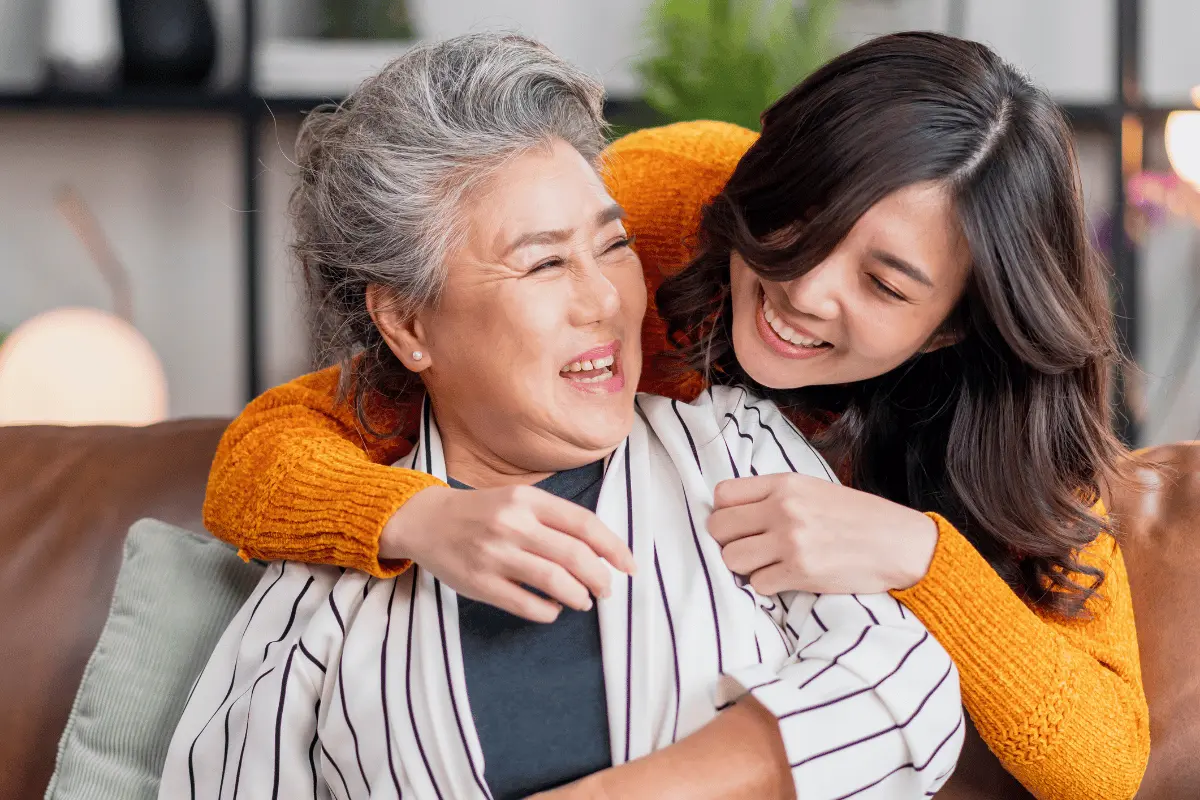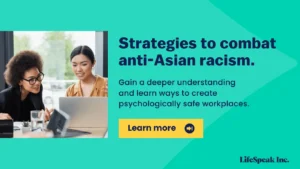Supporting First Generation Asian Mental Health Challenges
Supporting First Generation Asian Mental Health Challenges
Navigating the complexities of mental health challenges as a first generation Asian immigrant can be uniquely difficult. In honor of National Minority Mental Health Awareness Month, we’re featuring the words of LifeSpeak expert Yiching Chua, Asian mental health therapist and social worker. In this insightful article, Yiching delves into the cultural, familial, and societal factors that affect mental wellbeing in this diverse community. Yiching shares her personal experiences and professional insights to help us understand the importance of addressing these challenges with compassion and culturally relevant support.
As first generation Asian immigrants, we often find ourselves between two worlds. Whether we have come to settle in a new place as a child or an adult (that may or may not have been our choice or within our control) there is a sense of disconnection. Feeling that we don’t belong here or back home. This feeling of disconnection is an outcome of cultural dysphoria.
The feeling of not belonging because we look, speak, and live differently than our Western peers and not necessarily having a sense of belonging with our communities back home, impacts not just our feelings of loneliness and isolation, but our mental health and wellbeing.
As immigrants we know this feeling all too well and yet we somehow still struggle with reaching out for mental health support. Why is that?
Diversity within our community
As Asians, we are often grouped as one and that’s exactly why it’s been so difficult for us to be able to navigate between our values and beliefs while embracing mental health and wellbeing. We, ourselves, are so diverse. We have different languages and dialects, religious and faith backgrounds, food, music, and even histories. Our diversity is what makes us so unique as a community and what can also hinder us from knowing when to reach out for help and support.
For example, for our East and South Asian peers, their religious backgrounds of Buddhism or Hinduism may see mental health challenges as an outcome of karma or spiritual consequences. Or our South Asian peers who have beliefs in the caste system may see mental health issues as a class struggle. Or our East Asian peers, who often see mental health challenges as a result of family shame, often blaming the parents for not being “strict enough” thereby making bad decisions or being weak.
With our diversity, it can be difficult to address mental health challenges that support familial, social, and cultural/religious differences. However, our similarities within our collective cultures can help us learn to understand what helps us to be well. We value health in the most efficient sense. Health = making good choices. Not catching a cold by washing our hair and going outside. Not drinking cold water as this impacts our 氣(qì), the energy within us. Using 刮痧 (guāshā) a tool to get the heat out of our bodies when we are not feeling well (which has been appropriated by Western beauty practices). Eating specific foods, spices, or herbs that gives us energy and vitality. However, sometimes these beliefs in making good choices further stigmatize us in reaching out.
“As Asians, we don’t even whisper that we’re struggling with our mental health, rather we try to convince ourselves that we can fix the problem that we may be facing by working harder.”
Organizations looking to support culturally inclusive mental health care can turn to LifeSpeak Holistic Wellness, which offers employees expert-led guidance they can access anytime.
Stigma around mental health challenges
Mental health in our community doesn’t exist in the way Western countries and cultures contextualize it as our adopted culture sees mental health like any other aspect of health. In the general sense, as Asians when we talk about mental health challenges, it is seen as a weakness, bringing immense shame to our families. Weakness in the choices we make, weakness in our family which is passed down from our parents and ancestors, and weakness in our personalities. The term “crazy” is usually associated with any mental health challenges. The feelings of guilt and shame are all too familiar within our communities. We often see our circumstances of our own doing.
Working with Asian immigrant clients, I often hear these statements:
“I just need to try harder, and I’ll succeed in school/work. I’m just not working hard enough.”
“I’m just lazy. I’ve been hit as a child by my teachers/parents/family members because I wasn’t fast enough in school. That’s why I’m having so much trouble now in life.”
“I need to just keep pushing myself. Then I’ll feel better.”
“I’m not crazy, I just need to stop thinking about it.”
“I’m just tired. There’s nothing wrong with me. I just need to rest and drink more soup with more goji berries, ginseng (insert some sort of herbal or food ingredient).”
Although there is something to be said about Eastern herbs and spices supporting immunity and health, the problems lie in the idea that eating/drinking certain foods will help us when we are struggling with emotional and mental health problems.
As Asians, we don’t even whisper that we’re struggling with our mental health, rather we try to convince ourselves that we can fix the problem that we may be facing by working harder.
Beliefs and values
Now of course sometimes it can be our choices that impact our wellbeing. We can’t argue against the autonomy we have as individuals. And these beliefs and values we hold as Asian immigrants stem from a much deeper sense that has been planted many years ago prior to coming to our adopted home. As children of immigrants who came to a country of settlement, we can now reflect on these experiences as first-generation Asians. These experiences are deepened with beliefs of shame and guilt, through the lack of bad decisions one makes or weaknesses.
I recall my mother saying this phrase many times when I would share some thought or feeling that I didn’t understand: 不要胡说乱想 (Bùyào húshuō luàn xiǎng) which means, “Don’t think nonsense.” Or when I expressed some sort of frustration or concern, mostly around school or friends, she would usually respond with something along the lines of: 你要学会吃苦 (Nǐ yào xuéhuì chīkǔ), “You need to learn how to endure hardships.” Even the term 吃苦(chīkǔ) would have the literal translation of “eat hardship”, essentially saying that one would push down and swallow despair. It is safe to say that we all have heard some of these phrases (which usually have themes of invalidating, dismissing, ignoring, and avoiding any conflicts or difficulties when it comes to our thoughts and/or emotions) in our lives growing up in Asian households by those who cared for us which has continued to feed into our shame and guilt of making bad decisions or being too weak.
Potentially as readers you may think my mother’s actions were invalidating, unconcerned for my thoughts or feelings. And there’s truth to that. However, if we look at this deeper using a lens of trauma-informed practice, along with radical acceptance, we will see that these beliefs and value systems that were seeded in my early years were protection.
My mother, although she lacked emotional compassion and validation in those moments, did what she only knew (from her own experience and upbringing) which was to teach me how to fend for myself in this foreign land. This has taken many years and my own professional and personal development through learning (and unlearning) to lead me to this realization. Again, this may not be the case for all of us (especially for those who have experienced abuse and trauma which, please hear me when I say that it’s not on you to be the one to use the lens of trauma-informed practice when viewing the perpetrator) and yet when we can take a step back and start using different lenses in looking at our situation this can help us heal.
Mental health challenges
If we can envision what makes sense for us as first-generation Asians is not the wrong choices one makes or weaknesses in our personalities or families; rather it is a part of life. Just as physical health is important to our wellbeing, so is nurturing our mental and emotional health. Life is hard and even more so as immigrants. Perhaps it’s navigating learning a new language or social and cultural customs and rules, learning how to engage in social relationships and interactions in our workplace or school; or even adjusting to the weather, these are all stressors that would impact any of our well-being. How could it not?
Shifting belief systems
Understanding the diversity within our communities and the stigma that we may hold about mental health challenges, we need to look beyond the colonial, Western approach to supporting our own mental health. We need to embrace that some our beliefs and values that we hold, consciously or subconsciously, may not be helpful. How do we do this?
- Self-awareness – For some of us, this may be difficult because the practice of self-awareness is the ability to focus on ourselves, needs, desires, and wants. For many Asian immigrants who grew up with cultural and familial values of always supporting the collective family, this is a foreign concept. We can practice self-awareness by being mindfully present while checking in with ourselves through self-reflection.
- Self-reflection – Self-reflection is giving yourself time to focus on your own thoughts, feelings, goals, or desires rather than being concerned about others. This practice can further help you understand what you need or want as an individual. Sometimes these self-reflections may cause us to feel guilty or shameful; therefore, it’s important to practice self-compassion.
- Self-compassion – Recognizing that self-compassion is the same compassion that you can give yourself that you would give others. We have been raised to understand the importance of helping others so now the message is that it is just as important to help yourself.
Through shifting these systems of beliefs, we can finally start taking steps toward supporting our mental health and well-being. You deserve to be well and so does your family. Take the first step in seeking out culturally relevant support when you’re ready.
Author’s Note: As a first-generation Chinese Malaysian who settled on Turtle Island (as we know as Canada) as a young child, I am extremely aware that my lived experience will be different than my other Asian peers who may have come from different cultural and ethnic backgrounds (or even my peers who settled in these lands as adults). It is my hope that as you read this blog, you can see a part of yourself reflected in this piece and take what makes sense for you to further support your understanding in deepening your relationship with yourself, family, and culture with the goal of supporting your mental health and wellbeing.
Interested in ways to support the wellbeing of culturally diverse teams at your organization?
LifeSpeak Holistic Wellness includes inclusive, expert-led resources focused on mental, physical, and emotional health. Access tools and on-demand learning to help your workforce manage challenges and stay connected.
To learn more about our full range of support solutions, request a demo today.
About the author, LifeSpeak Inc. expert Yiching Chua, 蔡亦靜, Asian mental health therapist, social worker
 Yiching (pronounced E Ching) is a Malaysian Chinese immigrant and first-generation Canadian. She is an Asian mental health therapist and social worker with 14 years of clinical experience working with children, youth, parents, and adults. She received her Masters of Social Work from the University of Toronto and has numerous clinical training hours and certificates in Solution Focused Therapy, Cognitive and Dialectical Behavioural Therapies, Emotion Focused Coaching, and Mindfulness. Yiching also offers Culturally Adapted Cognitive Behavioural Therapy (CaCBT) for racialized individuals that helps support clients in learning and implementing CBT skills using a culturally relevant and faith-based approach. Yiching is a member of the Ontario College of Social Workers and Social Service Workers and the Ontario Association of Social Workers.
Yiching (pronounced E Ching) is a Malaysian Chinese immigrant and first-generation Canadian. She is an Asian mental health therapist and social worker with 14 years of clinical experience working with children, youth, parents, and adults. She received her Masters of Social Work from the University of Toronto and has numerous clinical training hours and certificates in Solution Focused Therapy, Cognitive and Dialectical Behavioural Therapies, Emotion Focused Coaching, and Mindfulness. Yiching also offers Culturally Adapted Cognitive Behavioural Therapy (CaCBT) for racialized individuals that helps support clients in learning and implementing CBT skills using a culturally relevant and faith-based approach. Yiching is a member of the Ontario College of Social Workers and Social Service Workers and the Ontario Association of Social Workers.
Frequently Asked Questions:
What mental health issues affect first-generation Asian immigrants?
Many face stress, anxiety, and depression shaped by family expectations, language barriers, and stigma around seeking help.
Why is mental health still stigmatized in Asian communities?
In many cultures, mental health is seen as a private or taboo topic, leading to silence and reluctance to seek care.
How can families support first-generation members facing mental health challenges?
Listening without judgment, reducing pressure, and encouraging professional care from culturally informed providers can help.
Where can I find mental health support for Asian immigrants?
Look for therapists or organizations experienced in serving Asian or immigrant communities. Community centers and universities may also offer referrals.

